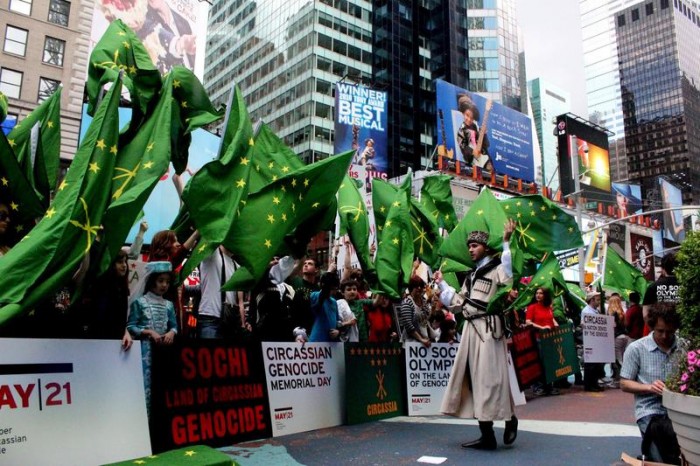Circassians Mark Two Important Anniversaries and Look to Future with Confidence
Publication: Eurasia Daily Monitor Volume: 16 Issue: 74
May 21 is the most unhappy day of the year for the more than half a million Circassians still living in their ancestral homeland and the more than five million who live in forced exile. On that date, in 1864—after a war that lasted more than a century—the Tsarist Russian military forced almost all the surviving Circassians to move to the Ottoman Empire, an action nearly all Circassians and many others today view as an act of “genocide.” The Republic of Georgia, for example, even officially declared it such in 2011 (Circassiancenter.org, May 20).
This year is the 155th anniversary of those horrific events, which still cast a dark shadow on the Circassian nation. Within the Russian Federation, the Circassians remain subdivided into six different “nationalities” without their own institutions and with their language increasingly under attack. Moreover, the Russian government is still trying to block the return of Circassians from war-torn Syria (see EDM, October 6, 2014). And Circassians abroad—numbering in the millions in Turkey and 55 other countries—are subject to powerful assimilatory pressure.
But this May 21 is also another important Circassian anniversary, the 30th, of the start of the Circassian national movement in the Soviet Union. In many important ways, that activism was ultimately unsuccessful: it did not then lead to the restoration of a unified Circassian republic, the government’s recognition that the Circassians were the most punished people of the country in whose borders they find themselves, or the return of Circassians from abroad. And because it did not achieve those goals, that activism has been largely forgotten. Nevertheless, this year, perhaps because it is a “round” anniversary, Circassians are pausing in their grief about 1864 to take pride in what happened in 1989. And many now see it as having established the agenda that they have been following in the past and believe they can realize in the future (Habze.org, May 20).
In the culminating years of the Soviet period, Circassian activists, although informed by the work of peoples’ fronts in the Baltic countries, were far more radical. They did not cast themselves as defenders of Soviet leader Mikhail Gorbachev’s perestroika as even Lithuania’s Sajudis did initially. Instead, the Circassians organized as a national liberation movement committed to reversing the results of the Russian war against them in the 18th and 19thcenturies, their expulsion from their historical homeland, the Soviet campaign against a single Circassian identity and territory, and the attacks on their language and culture from the 1920s to the present.
Because they did not have their own union republic then, the Circassian movement failed to attract widespread attention in the West, although Circassians in Turkey and elsewhere in the diaspora followed it closely. Their nation only came to the attention of the international community as a result of Vladimir Putin’s decision to organize the 2014 Winter Olympics in Sochi—precisely on the location from which the Circassians were expelled. Circassian activists in the West organized protests about that in Vancouver four years earlier and continued them through the Sochi Games, gaining the Circassians unprecedented attention (see EDM, January 19, 2011; May 23, 2012; November 6, 2013). Yet, because Moscow still ignored their demands, many people around the world ultimately decided that the Circassians were a spent force—and looked away.
In the wake of the Sochi Games, to be sure, there truly was a period of letdown even among Circassians. They had worked so hard and come up short. But many did not give up; and in the last year, they have achieved some remarkable things. Among the most remarkable of these Phoenix-like developments are the following:
- Circassians have opened a new office in Istanbul and gained a new lease on life for their office in Tbilisi, thus ensuring that contacts between the Circassians in the homeland and Circassians abroad will continue to expand (Kavkazsky Uzel, April 27).
- They have seen the publication of a study in Russia arguing that the Circassians were perhaps the most punished peoples in Soviet times, not just under the tsars—something that has given new urgency to their movement (NatPress, April 12).
- The Circassians have launched a new movement in the North Caucasus to have members of the various subgroups Moscow divided them into declare themselves “Circassians” in the upcoming 2020 census (Kavkazsky Uzel, March 7, April 12).
- Though faced with Moscow’s continuing opposition, the Circassians of the North Caucasus have organized their own groups to assist their co-ethnics from Syria and other foreign countries to return to their homeland (Habze.org, May 15).
- The Circassians have dramatically stepped up their use of the Internet, with many of them now viewing it as the salvation of their people and the basis of its success in the future (Open Democracy, April 18).
- Their leaders most recently have openly demanded that the Circassians be given the right to run their own affairs, perhaps the most direct challenge to Moscow’s rule in the North Caucasus since the glory days of 1989 (Habze.org, May 18).
- And the Circassians in the North Caucasus as well as across the diaspora have celebrated the election victories ethnic Circassians have won in Turkey, victories that will give them new influence there and new opportunities to advance their cause more generally (Kavkazsky Uzel, March 12, April 6).
These are not final victories, of course, but they are remarkable achievements at a time when many thought the Circassian cause was in eclipse. As a result, as Circassians mark the 155th anniversary of the 1864 tragedy and remember the movement of 1989, they can approach the future with more confidence than ever before and with possibly self-fulfilling optimism that they are on the right road (Circassian Progress, Kavkazr.com, March 20; Justice for North Caucasus, May 21)

